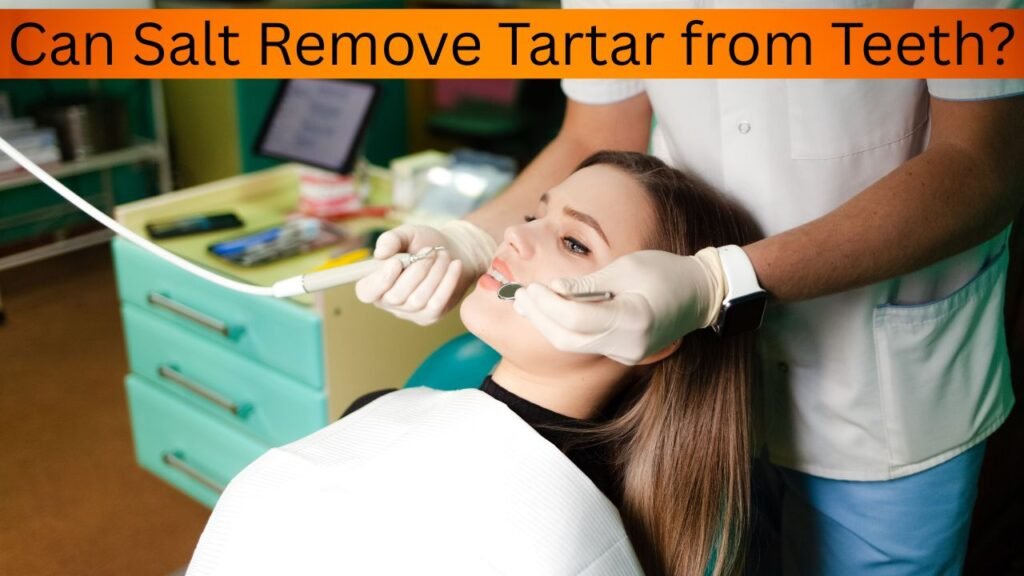Can Salt Remove Tartar from Teeth?
Wondering If Salt Can Really Scrub Away Tartar? Let’s Clear It Up
Tartar on your teeth isn’t just an eyesore—it’s a sign that your oral health might be slipping. And when people look for quick, natural fixes online, they often find one popular suggestion: use salt. Seems simple, right?
But here’s the deal—salt can’t remove tartar. It might help with some oral hygiene stuff like reducing bacteria or soothing gums, but when it comes to breaking down that hard, mineralized layer called tartar, salt just doesn’t cut it. Literally.
Let’s dive in and explain why.

🤔 What Is Tartar, Anyway?
Before we get into salt, let’s get one thing straight: what tartar is and why it’s different from plaque.
| Plaque | Tartar |
|---|---|
| Soft, sticky film full of bacteria | Hard, calcified deposit (aka calculus) |
| Forms daily on teeth | Develops when plaque isn’t removed in time |
| Can be brushed away | Requires professional dental tools |
Tartar is basically plaque that got left behind. Over time, it mixes with minerals in your saliva—like calcium phosphate—and hardens into a rough deposit that clings to your teeth and gumline. This process is called mineralization, and once it happens, tartar is tough stuff.
🧪 So Why Doesn’t Salt Work?
Salt is great for seasoning fries… and even for rinsing your mouth when gums are sore. But when it comes to removing hardened tartar, it simply doesn’t have the power.
Here’s why:
- No chemical breakdown power: Salt doesn’t contain acids or enzymes capable of dissolving calcium phosphate crystals, which form the backbone of tartar.
- No physical abrasion: Unlike dental tools, salt granules are too soft and inconsistent to chip away at tartar deposits.
- Doesn’t affect mineral matrix: Salt may reduce some surface bacteria, but it can’t break the actual mineral bond that holds tartar to your enamel.
Dr. Elaine Matthison, DDS (Ohio-based dentist), notes:
“People think salt scrubs the tartar off like sandpaper—but it doesn’t. Tartar is essentially rock-hard. Only a dental hygienist’s scaler can break that bond safely.”
⚖️ Salt vs Plaque: Know the Difference
Now here’s where things get a bit confusing. Salt can help reduce plaque if used regularly in rinses. That’s because plaque is still soft, and its bacterial content can be managed.
But once plaque hardens into tartar, the game changes.
Think of plaque like wet cement. You can wipe it away with a brush. But tartar? That’s like dried concrete. You’re not getting rid of it with a teaspoon of saltwater.
🦷 How Do Dentists Actually Remove Tartar?
If salt and other DIY tricks don’t work, then what does?
Dentists use a method called scaling, usually performed with ultrasonic scalers or manual curettes. These tools:
- Vibrate at high frequencies to disrupt tartar’s crystal structure
- Physically break apart the calcium phosphate matrix
- Clean below the gumline without damaging enamel
The tools basically shake the tartar off your teeth—something no kitchen ingredient can do.
🏠 What About Other Home Remedies?
Here’s a quick breakdown of some other so-called “natural tartar removers” and why they also don’t do the trick:
| Remedy | Why It Doesn’t Work |
|---|---|
| Baking Soda | Mildly abrasive; helps whiten but doesn’t break mineral bonds |
| Apple Cider Vinegar | Acidic, can erode enamel but doesn’t dissolve tartar |
| Hydrogen Peroxide | Great for whitening and bacteria but ineffective on hardened tartar |
| Lemon Juice | Very acidic—damages enamel faster than it helps |
| Charcoal Toothpaste | Gritty, but again, no chemical action on tartar |
These DIYs may help reduce surface stains or plaque, but none are strong enough to dislodge tartar’s mineralized form.
Dr. Jason Reynolds (Texas-based periodontist) warns:
“Using acids like vinegar or lemon to remove tartar is risky. You’re more likely to wear away your enamel than get rid of tartar.”
😬 Risks of Relying on Home Fixes
Waiting too long to get tartar professionally removed can actually make things worse:
- Gum irritation and gingivitis may turn into full-blown periodontitis
- Bad breath and tooth sensitivity increase as bacteria grow under tartar
- Enamel can get damaged by harsh DIY ingredients, not the tartar itself
It’s not just about clean teeth—it’s about keeping your mouth healthy long term.
✅ So… What Can Salt Do?
Let’s give salt some credit. Here’s what it can help with:
- Reducing bacteria in your mouth (especially in saltwater rinses)
- Soothing gum inflammation after dental work
- Helping prevent plaque before it hardens
But again, this is all preventative. Once tartar forms, salt’s just not enough.
📝 Key Takeaways (TL;DR)
- ❌ Salt cannot remove tartar – it lacks the physical and chemical power.
- 🧪 Tartar is made of calcium phosphate crystals – salt doesn’t dissolve these.
- ✅ Salt is only helpful for bacteria reduction and plaque prevention.
- 🦷 Only professional dental tools can safely break down and remove tartar.
- ⚠️ Home remedies like vinegar and lemon may damage enamel without affecting tartar.
conclusion:
If you’re seeing tartar buildup, don’t count on salt to save the day. It’s great for mouth rinses, but for the hard stuff? Trust a professional.
Tartar doesn’t just affect your smile—it affects your health. A visit to the dentist today could save you from big problems down the road.
And hey, keep brushing, flossing, and maybe swish with salt water if your gums are sore. But when it comes to tartar, leave it to the pros.